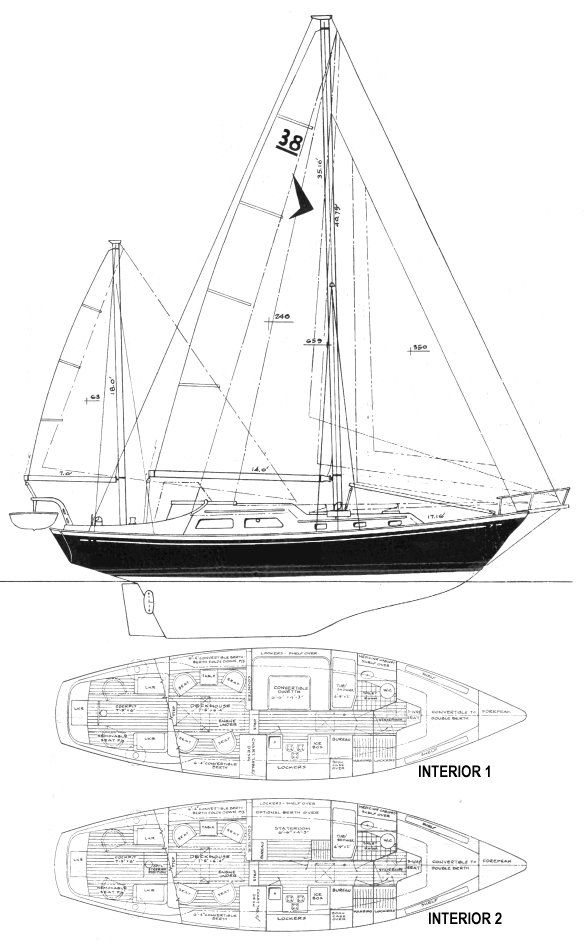The Seafarer 38 C KR is a robust and classic monohull sailboat, measuring just under 38 feet in overall length. Conceived primarily as a capable cruiser, this ketch-rigged vessel was designed by the esteemed naval architect Philip L. Rhodes. Built by Seafarer Fiberglass Yachts, Inc. in Huntington, New York, the 38 C KR represents a period when the builder was known for producing distinctive fiberglass yachts in collaboration with respected designers. It holds a reputation as a well-regarded vessel among those who appreciate solid construction and traditional lines.
Seafarer 38 C KR Information, Review, Specs

- Make
- Seafarer
- Model
- 38 C KR
- Number Built
- Production Year(s)
- 1972 - ??
Production of the Seafarer 38 C KR commenced in 1972. The boat was marketed under several names, including the Rhodes 38, Seafarer 38 Ketch, and Seafarer 38C, highlighting its design lineage. Designed by Philip L. Rhodes as a dedicated cruiser, the 38 C KR reflects his philosophy for seaworthy and comfortable vessels. The "KR" designation in its name refers to its ketch rig. Notably, it was also available with a masthead sloop or optional cutter rig, and could be fitted with either a short or tall mast, and an optional bowsprit. Many Seafarer models, including the 38 C KR, were offered in kit form, allowing owners to complete their boats and fostering a deeper connection with their vessels. Seafarer Fiberglass Yachts, which transitioned from an importer to a domestic builder in 1965, established a reputation for well-built fiberglass sailboats that benefited from collaborations with elite naval architects.
Sailing Performance and Handling
With a displacement of 16,500 pounds and a waterline length of 27.25 feet, the Seafarer 38 C KR is classified as a heavy displacement cruiser. This is evidenced by its Displacement-to-Length ratio of approximately 364, suggesting a boat designed for stable motion and offshore capability rather than light-air racing performance. Its Sail Area to Displacement ratio, around 13.4, further indicates that while adequately powered for cruising, it is not optimized for blistering speed in light winds, performing best as a steady, comfortable passagemaker. The boat's ballast-to-displacement ratio of approximately 33.3% contributes to a moderate level of stiffness and a good righting capability, allowing it to stand up to a breeze and providing a sense of security in various sea states. Owners generally find the boat stable and appreciate its robust handling characteristics, particularly in more challenging conditions.
Accommodations and Layout
Information regarding the precise interior layout of the Seafarer 38 C KR relies heavily on anecdotal accounts and typical designs of its era, as specific headroom figures are not consistently available in standard specifications. As a cruiser, the vessel typically features a practical layout aimed at comfortable living aboard. While details can vary, common arrangements for boats of this size would include a forward V-berth cabin, a main salon with settees that convert into berths, a galley, and a head compartment. Seafarer yachts of this period were generally known for solid construction and functional interiors, often featuring traditional woodwork and finishes. Storage solutions would be integrated throughout the cabin to support extended cruising.
Owner's Perspectives
Seafarer 38 C KR owners generally express appreciation for their vessels, often praising their solid construction and seaworthy characteristics. Many describe loving their boats, underscoring a strong sense of satisfaction among the ownership community. Owners frequently highlight the enduring quality of Seafarer's designs, attributing the boats' longevity to the robust build quality and the pedigree of their naval architects. Online forums and social media groups dedicated to Seafarer owners indicate an active community that shares experiences and maintains these classic yachts. While individual maintenance issues common to boats of this vintage may arise, such as potential fresh water system leaks or re-bedding of original deck fittings, the collective sentiment suggests a generally positive ownership experience, valuing the Seafarer 38 C KR as a capable and reliable cruising platform.
Measurements
Construction & Hull
- Construction Material
- Fiberglass (Balsa Core)
- Hull Type
- Monohull Sailboat
- Keel Type
- Long
- Rudder
- 1x —
- Ballast
- 5500 lbs (Lead)
- Displacement
- 16500 lbs
- Water Capacity
- -
- Fuel Capacity
- -
Engine
- Engine Make
- Perkins
- Engine Model
- —
- Engine Type
- —
- Engine HP
- —
- Engine Count
- 1
- Drive Type
- —
- Fuel Type
- Diesel
Rig & Sails
- Rig Type
- Ketch
- P (Main Luff)
- 35.16 ft
- E (Main Foot)
- 14 ft
- I (Foretriangle Height)
- 40.75 ft
- J (Foretriangle Base)
- 14.7 ft
- Forestay Length (est)
- 43.32 ft
- Main Sail Area
- 246.12 sqft
- Foretriangle Sail Area
- 299.51 sqft
- Total Sail Area (Reported)
- 609 sqft
- Total Sail Area (Calc)
- 545.63 sqft
Dimensions
- LOA
- 37.75 ft
- LWL
- 27.25 ft
- Beam
- 10.5 ft
- Draft
- 4.5 ft
- Max Headroom
- -
- Air Draft
- -
Calculations
- Hull Speed
- 7 kn
- Pounds per Inch Immersion
- 1